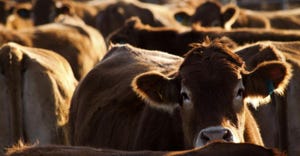Objective data says there is minimal risk of creating antibiotic-resistant bacteria in humans from the use of antibiotics on ranches and farms.

"We have to understand that there are times when science may not help us."
That is a startling revelation for the cattle industry, especially coming as it did from Scott Hurd, who has devoted his life to science. After all, virtually every advancement and improvement the cattle industry enjoys is the result of science. But Hurd, now at the College of Veterinary Medicine at Iowa State University and previously deputy undersecretary for food safety at USDA, says that value-based decisions and politics often trump science in the court of public opinion.
That is especially true in the debate about antibiotic use in food-producing animals.
"I've been involved in this antibiotic discussion since at least 2004 when I first published my risk assessment on the risk of antibiotic use in livestock," Hurd says. "The paper I published showed you are more likely to die from a bee sting than you were to get a few extra days of (illness) because of the use of a particular antibiotic (in food-producing animals)."
But, after he told this story a few times, somebody pointed out that people weren't listening. "I struggled with that. I wanted people listening to this. Objective data, 140 some references in the paper that says the risk is minimal (of creating antibiotic-resistant bacteria in humans from the use of antibiotics on ranches and farms)."
Hurd says part of the reason nobody listened to his story is because they didn't understand or appreciate the science. "But, also because they didn’t want to understand. They had some other motivating factors. Some of them may be political, some of them may be religious, some of them are thinking that life just ought not be that way. So science may not help in that."
That's frustrating for cattlemen who work hard every day to produce safe, quality beef. Especially when the science shows that the use of antibiotics in cattle production isn't a risk factor in creating antibiotic-resistant bacteria.
Hurd doesn't discount the problem of antibiotic-resistant bacteria. "They sound nasty. They are. They are a hazard." But he points out that most of the antibiotics that show resistance problems in humans, as identified by the Infectious Disease Society of America, don't have anything to do with agriculture.
Then he points out that antibiotic-resistant bacteria have been around for a long time and are found in many places. "They're on farms – conventional and organic farms; they're found in groundwater; deep ocean trenches; you find antimicrobial-resistant bacteria in sub-arctic seals; wild boars; baboons." And, recently, antibiotic-resistant bacteria have been found in 30,000-year-old permafrost. "And they swear no current livestock or animals have come in contact with that permafrost, based on genetic testing. They are found in places which are relatively untouched by human civilization. They're a hazard, they're out there, but they've been out there since the beginning of bacteria," he says.
But, in an emotional battle, none of that matters. So cattlemen and the cattle industry will continue to be faced with the problem of developing policy and influencing politics in the debate over antibiotic use, and doing so in a political and public perception environment that likely won"t care what the science says, he adds.
About the Author(s)
You May Also Like

.png?width=300&auto=webp&quality=80&disable=upscale)

